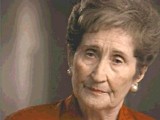You searched for: 代谷歌seo开户推广包上【TG飞机:@bapingseo】科特迪瓦google霸屏推廣排名【TG电报:@bapingseo】小奶牛引流【Telegram:@bapingseo】AG在线yabo88体育的下载?1TzKNL/F0nakd.html
<< Previous | Displaying results 931-940 of 958 for "代谷歌seo开户推广包上【TG飞机:@bapingseo】科特迪瓦google霸屏推廣排名【TG电报:@bapingseo】小奶牛引流【Telegram:@bapingseo】AG在线yabo88体育的下载?1TzKNL/F0nakd.html" | Next >>
-
The Eastern Front: The German War against the Soviet Union
ArticleOften referred to as the “eastern front,” the German-Soviet theater of war was the largest and deadliest of World War II. Learn more about the background and key events.
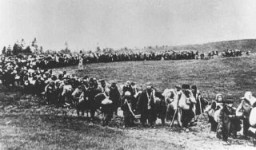
-
"Nuremberg: Its Lesson for Today"
FilmThis footage comes from "Nuremberg, Its Lesson for Today" a 1947 documentary film produced by the US military's Documentary Film Unit, Information Services Division. The film, directed by Pare Lorentz and Stuart Schulberg, shows footage from the trial of Nazi war criminals by the International Military Tribunal. It also intermixes historical footage depicting the founding of the Nazi state, the unleashing of World War II, and Nazi crimes against humanity. The sentencing sequence shown here illustrates the…
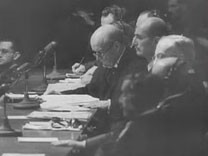
-
Charlene Schiff describes being caught while trying to smuggle food into the Horochow ghetto
Oral HistoryBoth of Charlene's parents were local Jewish community leaders, and the family was active in community life. Charlene's father was a professor of philosophy at the State University of Lvov. World War II began with the German invasion of Poland on September 1, 1939. Charlene's town was in the part of eastern Poland occupied by the Soviet Union under the German-Soviet Pact of August 1939. Under the Soviet occupation, the family remained in its home and Charlene's father continued to teach. The Germans…
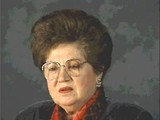
-
Charlene Schiff describes forced labor in the Horochow ghetto
Oral HistoryBoth of Charlene's parents were local Jewish community leaders, and the family was active in community life. Charlene's father was a professor of philosophy at the State University of Lvov. World War II began with the German invasion of Poland on September 1, 1939. Charlene's town was in the part of eastern Poland occupied by the Soviet Union under the German-Soviet Pact of August 1939. Under the Soviet occupation, the family remained in its home and Charlene's father continued to teach. The Germans…
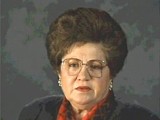
-
Lucine Horn describes her escape from the Majdan Tatarski ghetto
Oral HistoryLucine was born to a Jewish family in Lublin. Her father was a court interpreter and her mother was a dentist. War began with the German invasion of Poland on September 1, 1939. Lucine's home was raided by German forces shortly thereafter. Soon after the German occupation of Lublin, Jews there were forced to wear a compulsory badge identifying them as Jews. A ghetto in Lublin was closed off in January 1942. Lucine survived a series of killing campaigns and deportations from the ghetto during March and…
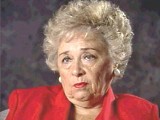
-
Ludmilla Page recalls arriving in Auschwitz instead of Oskar Schindler's munitions factory in Brünnlitz
Oral HistoryLudmilla was born to an assimilated Jewish family in Kishinev, Romania. She and her mother, a physician, were living in Poland when the Germans invaded on September 1, 1939. They were taken to Krakow. Ludmilla was forced to live in the Krakow ghetto; her mother was sent to the Warsaw ghetto. Ludmilla worked in a factory at the Plaszow labor camp for a businessman who was a friend of the German industrialist Oskar Schindler. In October 1944, Schindler attempted to save some Jewish workers by relocating them…
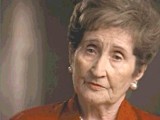
-
Ludmilla Page describes leaving Auschwitz and arriving at the Bruennlitz munitions factory in the Sudetenland
Oral HistoryLudmilla was born to an assimilated Jewish family in Kishinev, Romania. She and her mother, a physician, were living in Poland when the Germans invaded on September 1, 1939. They were taken to Krakow. Ludmilla was forced to live in the Krakow ghetto; her mother was sent to the Warsaw ghetto. Ludmilla worked in a factory at the Plaszow labor camp for a businessman who was a friend of the German industrialist Oskar Schindler. In October 1944, Schindler attempted to save some Jewish workers by relocating them…
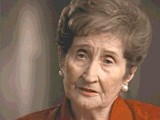
-
Benjamin (Ben) Meed describes Warsaw after the German occupation in 1939 and first experiencing antisemitism
Oral HistoryBen was one of four children born to a religious Jewish family. Germany invaded Poland on September 1, 1939. After the Germans occupied Warsaw, Ben decided to escape to Soviet-occupied eastern Poland. However, he soon decided to return to his family, then in the Warsaw ghetto. Ben was assigned to a work detail outside the ghetto, and helped smuggle people out of the ghetto—including Vladka (Fagele) Peltel, a member of the Jewish Fighting Organization (ZOB), who later became his wife. Later, he went into…
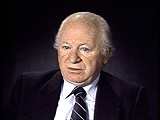
-
Benjamin (Ben) Meed describes the burning of the Warsaw ghetto during the 1943 ghetto uprising
Oral HistoryBen was one of four children born to a religious Jewish family. Germany invaded Poland on September 1, 1939. After the Germans occupied Warsaw, Ben decided to escape to Soviet-occupied eastern Poland. However, he soon decided to return to his family, then in the Warsaw ghetto. Ben was assigned to a work detail outside the ghetto, and helped smuggle people out of the ghetto—including Vladka (Fagele) Peltel, a member of the Jewish Fighting Organization (ZOB), who later became his wife. Later, he went into…
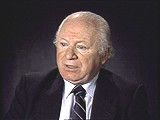
-
Ludmilla Page describes arrival at the Brünnlitz munitions factory
Oral HistoryLudmilla was born to an assimilated Jewish family in Kishinev, Romania. She and her mother, a physician, were living in Poland when the Germans invaded on September 1, 1939. They were taken to Krakow. Ludmilla was forced to live in the Krakow ghetto; her mother was sent to the Warsaw ghetto. Ludmilla worked in a factory at the Plaszow labor camp for a businessman who was a friend of the German industrialist Oskar Schindler. In October 1944, Schindler attempted to save some Jewish workers by relocating them…
